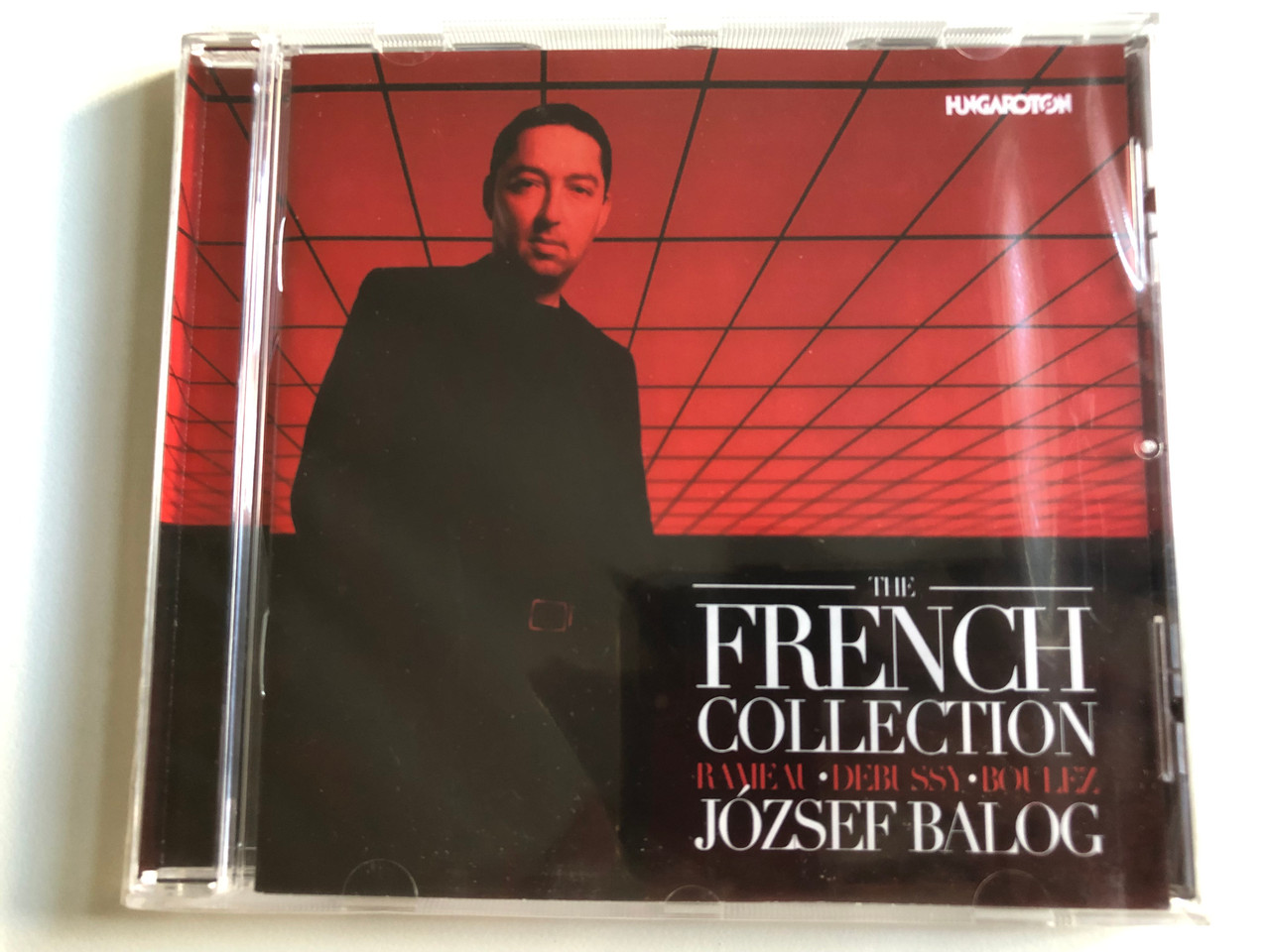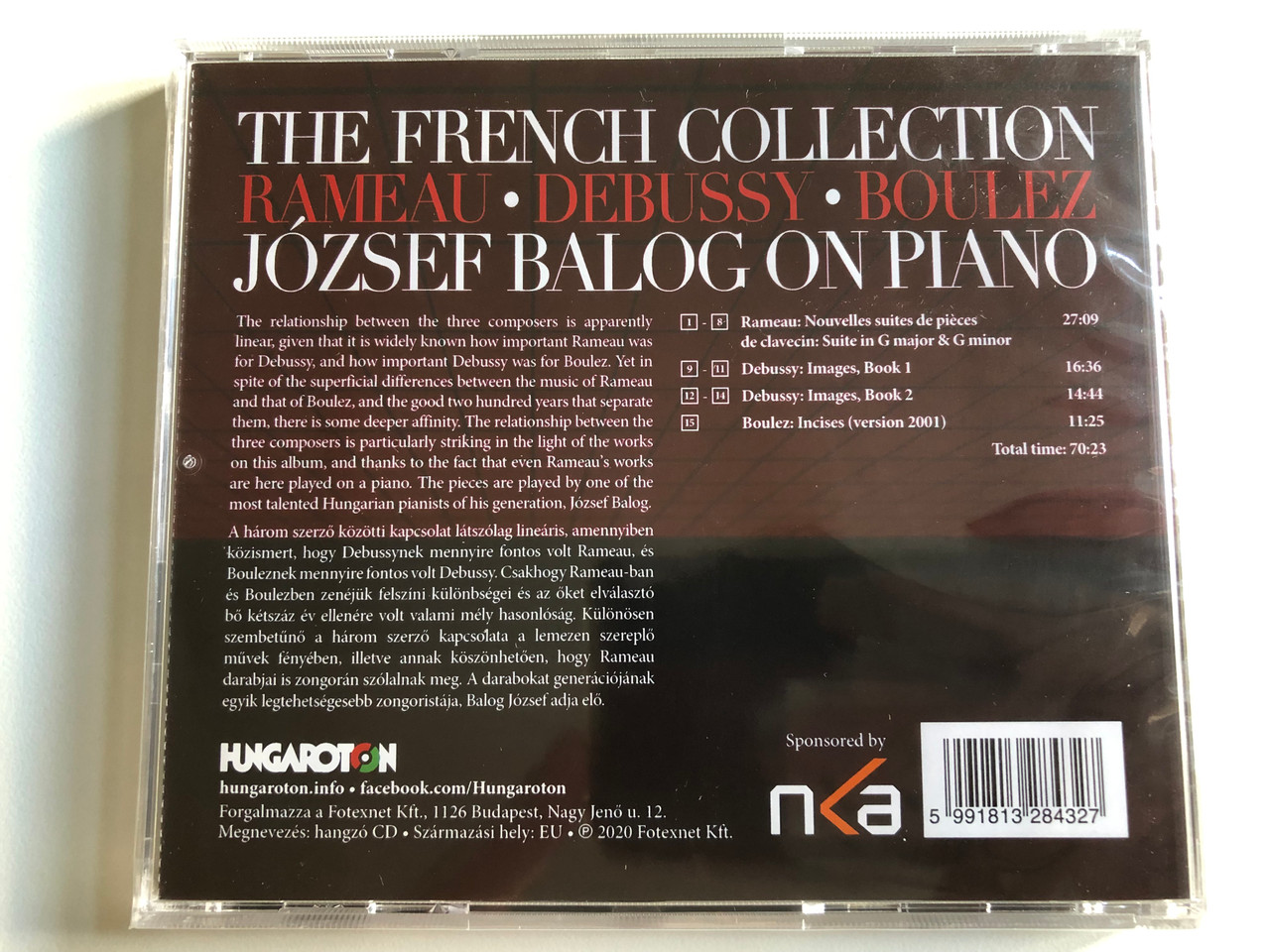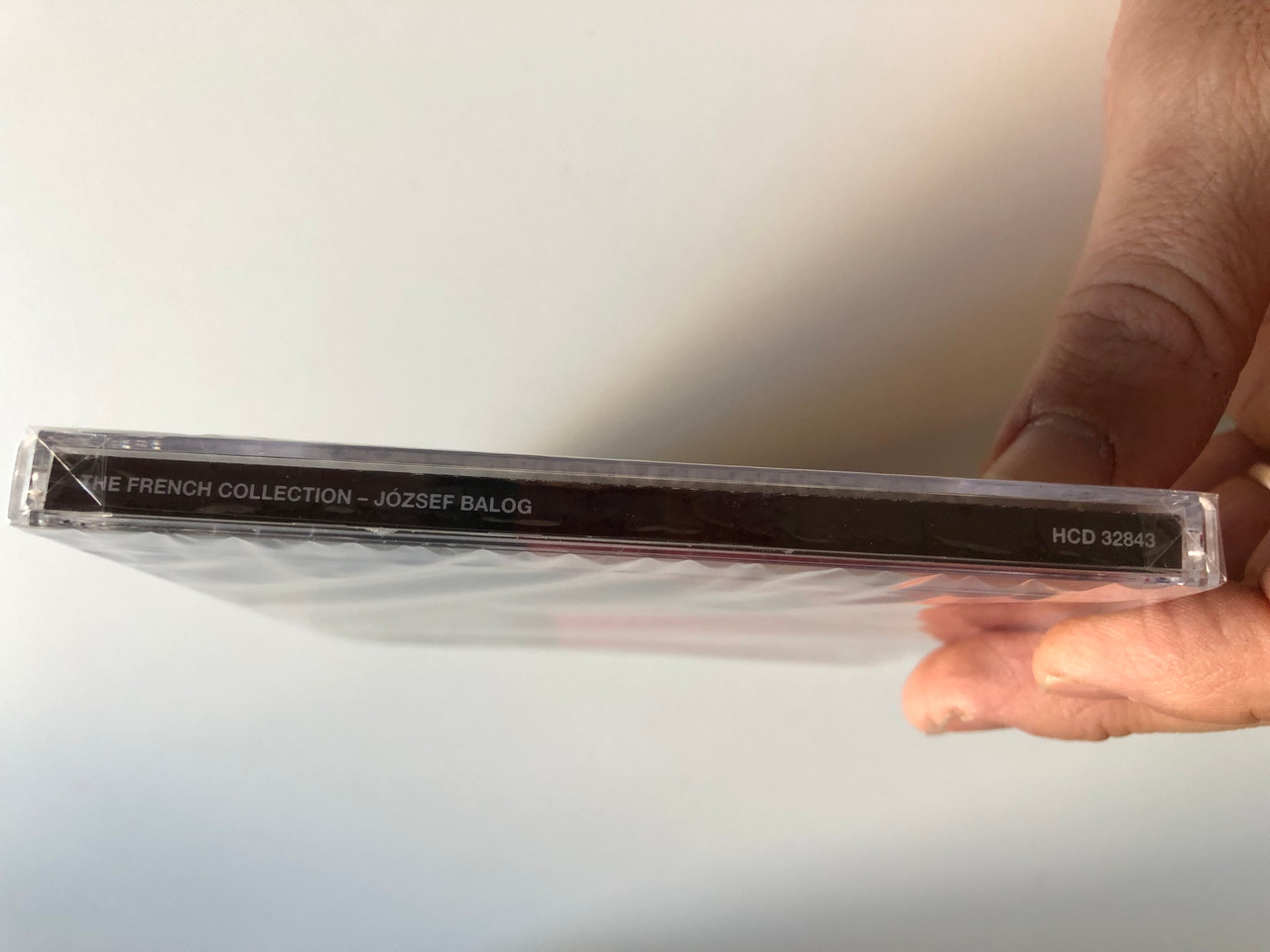Product Overview
The French Collection - Rameau, Debussy, Boulez - Jozsef Balog / Hungaroton Audio CD 2020 / HCD 32843
UPC 5991813284327
Jean-Philippe Rameau (French: [ʒɑ̃filip ʁamo]; 25 September 1683 – 12 September 1764) was one of the most important French composers and music theorists of the 18th century. He replaced Jean-Baptiste Lully as the dominant composer of French opera and is also considered the leading French composer of his time for the harpsichord, alongside François Couperin.
Little is known about Rameau's early years. It was not until the 1720s that he won fame as a major theorist of music with his Treatise on Harmony (1722) and also in the following years as a composer of masterpieces for the harpsichord, which circulated throughout Europe. He was almost 50 before he embarked on the operatic career on which his reputation chiefly rests today. His debut, Hippolyte et Aricie (1733), caused a great stir and was fiercely attacked by the supporters of Lully's style of music for its revolutionary use of harmony. Nevertheless, Rameau's pre-eminence in the field of French opera was soon acknowledged, and he was later attacked as an "establishment" composer by those who favoured Italian opera during the controversy known as the Querelle des Bouffons in the 1750s. Rameau's music had gone out of fashion by the end of the 18th century, and it was not until the 20th that serious efforts were made to revive it. Today, he enjoys renewed appreciation with performances and recordings of his music ever more frequent.
(Achille) Claude Debussy (French: [aʃil klod dəbysi]; 22 August 1862 – 25 March 1918) was a French composer. He is sometimes seen as the first Impressionist composer, although he vigorously rejected the term. He was among the most influential composers of the late 19th and early 20th centuries.
Born to a family of modest means and little cultural involvement, Debussy showed enough musical talent to be admitted at the age of ten to France's leading music college, the Conservatoire de Paris. He originally studied the piano, but found his vocation in innovative composition, despite the disapproval of the Conservatoire's conservative professors. He took many years to develop his mature style, and was nearly 40 when he achieved international fame in 1902 with the only opera he completed, Pelléas et Mélisande.
Debussy's orchestral works include Prélude à l'après-midi d'un faune (1894), Nocturnes (1897–1899) and Images (1905–1912). His music was to a considerable extent a reaction against Wagner and the German musical tradition. He regarded the classical symphony as obsolete and sought an alternative in his "symphonic sketches", La mer (1903–1905). His piano works include two books of Préludes and one of Études. Throughout his career he wrote mélodies based on a wide variety of poetry, including his own. He was greatly influenced by the Symbolist poetic movement of the later 19th century. A small number of works, including the early La Damoiselle élue and the late Le Martyre de saint Sébastien have important parts for chorus. In his final years, he focused on chamber music, completing three of six planned sonatas for different combinations of instruments.
With early influences including Russian and Far Eastern music, Debussy developed his own style of harmony and orchestral colouring, derided – and unsuccessfully resisted – by much of the musical establishment of the day. His works have strongly influenced a wide range of composers including Béla Bartók, Olivier Messiaen, George Benjamin, and the jazz pianist and composer Bill Evans. Debussy died from cancer at his home in Paris at the age of 55 after a composing career of a little more than 30 years.
Pierre Louis Joseph Boulez CBE (French: [pjɛʁ lwi ʒozεf bulɛz]; 26 March 1925 – 5 January 2016) was a French composer, conductor, writer and founder of several musical institutions. He was one of the dominant figures of the post-war classical music world.
Born in Montbrison in the Loire department of France, the son of an engineer, Boulez studied at the Conservatoire de Paris with Olivier Messiaen, and privately with Andrée Vaurabourg and René Leibowitz. He began his professional career in the late 1940s as music director of the Renaud-Barrault theatre company in Paris. As a young composer in the 1950s he quickly became a leading figure in avant-garde music, playing an important role in the development of integral serialism and controlled chance music. From the 1970s onwards he pioneered the electronic transformation of instrumental music in real time. His tendency to revise earlier compositions meant that his body of completed works was relatively small, but it included pieces regarded by many as landmarks of twentieth-century music, such as Le Marteau sans maître, Pli selon pli and Répons. His uncompromising commitment to modernism and the trenchant, polemical tone in which he expressed his views on music led some to criticise him as a dogmatist.
In parallel with his activities as a composer, Boulez became one of the most prominent conductors of his generation. In a career lasting more than sixty years, he held the positions of chief conductor of the BBC Symphony Orchestra and music director of the New York Philharmonic, music director of the Ensemble intercontemporain, and principal guest conductor of the Chicago Symphony Orchestra and the Cleveland Orchestra. He made frequent guest appearances with many of the world's other great orchestras, including the Vienna Philharmonic, the Berlin Philharmonic and the London Symphony Orchestra. He was particularly known for his performances of the music of the first half of the twentieth century—including Debussy and Ravel, Stravinsky and Bartók, and the Second Viennese School—as well as that of his contemporaries, such as Ligeti, Berio and Carter. His work in the opera house included the Jahrhundertring—the production of Wagner's Ring cycle for the centenary of the Bayreuth Festival—and the world premiere of the three-act version of Alban Berg's Lulu. His recorded legacy is extensive.
He founded a number of musical institutions in Paris, including the Domaine musical, the Institut de recherche et coordination acoustique/musique (IRCAM), the Ensemble intercontemporain and the Cité de la Musique, as well as the Lucerne Festival Academy in Switzerland.
Tracklist:
1 - 8. Rameau: Nouvelles suites de pieces de clavecin: Suite in G major & G minor 27:09
9 - 11. Debussy: Images, Book 1 16:36
12-14. Debussy: Images, Book 2 14:44
15. Boulez: Incises (version 2001) 11:25












